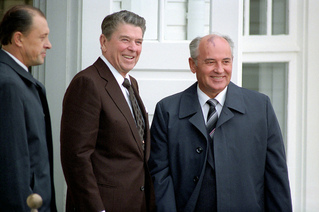| | the Soviet people about freedom and its relationship to economic progress. This was during the final months of the old Soviet state, and the grip of communism was beginning to crack in ways people could sense were impossible to mend. Reagan spoke to students at Moscow State University, but his speech was broadcast to that nation — the first time a U.S. president had been able to speak directly to the Soviet people. It also was the dawn of the information age that has since come to dominate lives, disrupt old industries and give birth to new ones that today rival anything in existence in 1988. Reagan made note of this, telling the students that entrepreneurs are “the explorers of the modern era.” He spoke indirectly of Apple, saying, “In fact, one of the largest personal computer firms in the United States was started by two college students, no older than you, in the garage behind their home.” Today, as has been widely reported, Apple has more cash on-hand than the federal government. But to prove Reagan’s point about the value of freedom and entrepreneurship, the world was still eight years from the founding of Google and 18 years from Twitter’s first tweet. There is no reason to believe entrepreneurs, looking for ways to solve problems, aren’t yet going to develop ideas that will change the world, if they are allowed the freedom to do so. The real concern today is not so much whether former Soviet states have grasped what Reagan said that day. Some have, with remarkable success, and others have not. The larger question is whether the United States still holds those ideals; whether we still get “why it’s so hard for government planners, no matter how sophisticated, to ever substitute for millions of individuals working night and day to make their dreams come true;” or that “no single person, no single authority or government has a monopoly on the truth…” It is whether we still value the role of religion, which took up a sizeable portion of that speech. Reagan identified religion as a necessary counterweight to freedom’s tendency to make people “selfish and materialistic.” This, he said, is because people “know that liberty, just as life itself, is not earned but a gift from God…” “Go to any American town … and you’ll see dozens of churches, representing many different beliefs — in many places, synagogues and mosques — and you’ll see families of every conceivable nationality worshipping together. Go to any schoolroom, and there you will see children being taught the … guarantees in their Constitution for freedom of speech, freedom of assembly, and freedom of religion.” Four years ago, President Barack Obama seemed to be channeling Reagan as he spoke to audiences in the Middle East and in Russia. "It is our commitment to certain universal values which allows us to correct our imperfections," he said. And yet the Affordable Care Act’s paternalistic coercion of religious health care providers to provide birth control and other things that may violate their conscience seems an awful lot like a government that believes it has a monopoly on truth. The same can be said when some American cities are able to revoke the licenses of church-sponsored charities because they won’t adopt children to couples who are unmarried or of the same gender. A newly released State Department report paints a dismal picture of religious freedom worldwide, citing violence against believers in many nations. Problems in the United States pale compared to these. And yet it was President Bill Clinton who once said, “People are more impressed by the power of our example rather than the example of our power...” The United States always has struggled to live up to its ideals. That was true 25 years ago, as well. But it’s worth considering today whether we are moving toward or away from the principles spoken of so eloquently that day in Moscow. |
|
0 Comments
Your comment will be posted after it is approved.
Leave a Reply. |
Search this siteLike what you read here? Please subscribe below, and we'll let you know when there is a new opinion.
The author
Jay Evensen is the Opinion Editor of the Deseret News. He has more than 40 years experience as a reporter, editor and editorial writer in Oklahoma, New York City, Las Vegas and Salt Lake City. He also has been an adjunct journalism professor at Brigham Young and Weber State universities. Archives
July 2024
Categories
All
Links
|


 RSS Feed
RSS Feed

